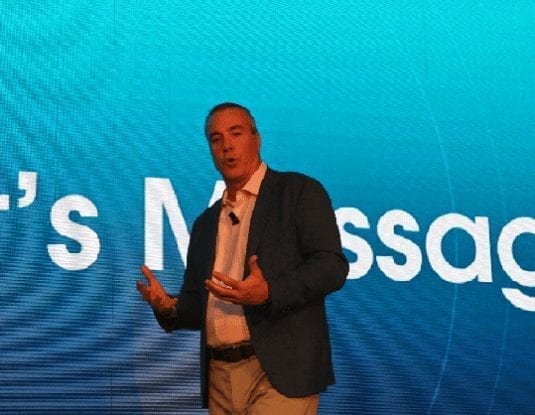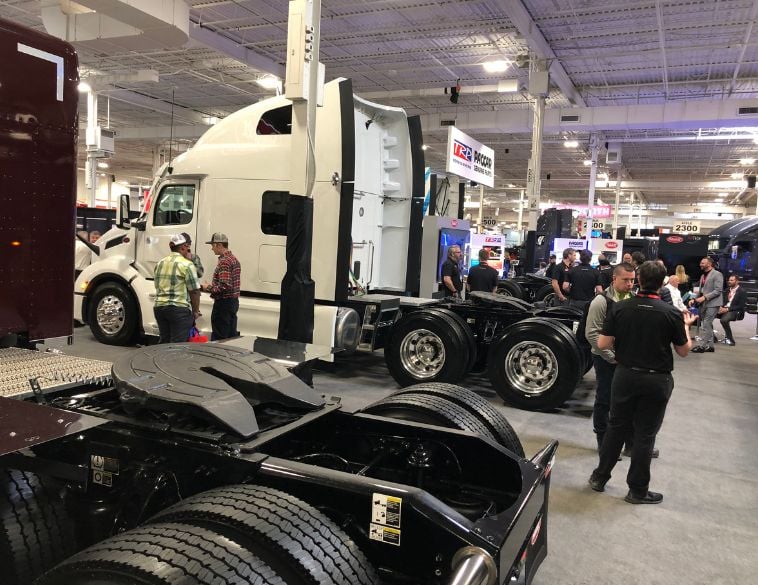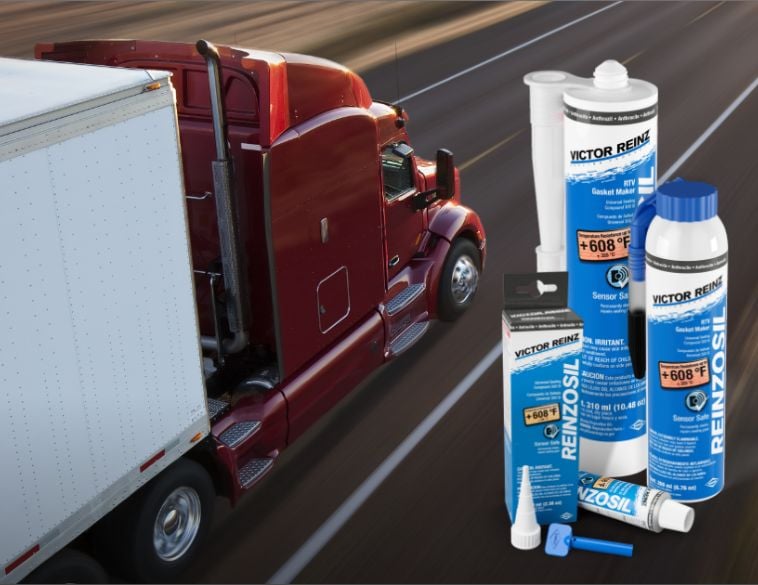Sunny skies and balmy Florida breezes greeted attendees for the 2019 Holman Best in Fleet Conference in Fort Lauderdale November 5-7.
The three-day event, hosted at the Ritz-Carlton, featured a whole range of topics and guest speakers, covering everything from current trends in fleet management to advances in technology, as well as using that technology and data to mitigate risk. Also fascinating were some real courtroom case studies and lessons that fleet managers can learn from these specific outcomes.
As data (and effectively managing it) becomes an ever more important part of the business, providing an integrated fleet value chain becomes essential, as does the ability to know which vehicles to order, when to order them and how to remove those that are costing you both time and money.
ARI President Bob White kicked things off by welcoming attendees and providing updates on the company’s services and initiatives, including its Equipment Direct program, as well as its Driver Centered Platform App. Both of these are aimed at improving efficiencies for fleet businesses, allowing them to make informed decisions regarding driver performance and behaviour, as well as an effective outlet to dispose of surplus vehicles and specialty equipment via an online auction portal.
Women’s Business Enterprise Recognition
A major announcement was that ARI has been officially recognized by Women’s Business Enterprise National Council for its contributions toward gender equality in the workplace. By receiving national certification as a Women’s Business Enterprise, ARI is currently the only full-service fleet management company to receive this certification. “All of us at Holman are proud to represent this certification,” said Bob White “and the investments made to us through the certification process means we can offer more to you, our customers.”
Keeping abreast of industry trends can be challenging, especially in today’s fast-paced world, but Trip O’Neil ARI’s Vice President of Sales for the Southern U.S., noted that with the U.S. Federal Reserve having cut interest rates for the third time this year and with lower energy prices forecast for the foreseeable future, this lower cost operating environment can prove beneficial to fleets.
O’Neil said however that with conversations revolving around what he described as “peak car” or maximum vehicle demand, falling sales and contraction within the automotive OEM sphere are likely to have an impact on the industry. O’Neil did have some positive news to share at the conference however. “One shining point,” he said, “is that the commercial fleet industry is growing.” He also noted that while demand for passenger cars continues to fall, that for pickups and SUVs keeps growing.
O’Neil said it was important for fleet businesses to beware of the changes happening in the overall vehicle market and respond accordingly. “Sedans are holding their value, but we are starting to see secondary declines entering the market,” he said. In addition, continuing fears around tariffs and trade, including the U.S./China dispute are fueling uncertainty and with OEMs having cut back production capacity and operating fewer assembly plants, this is putting pressure on deliveries, meaning that fleets need to be strategic in how they acquire and off-load vehicles, such as planning for longer delivery times and making sure they order vehicles that not only fit their needs but also can have strong resale value.
Looking to the future
With vehicle OEMs continuing to pour billions of dollars into electric vehicles, connectivity and new forms of mobility solutions, the first panel discussion of the conference was an interesting one. Moderated by Peter Nogalo, Marketing Manager at ARI it included Vice President of Ford Motor Company’s Mobility Group Marrion Harris, as well as Chris Donus, Vice President of Express Drive at Lyft.
At Ford, investment in electric vehicles has given rise to a prototype battery electric F-150 pickup and the new “Mustang inspired” crossover debuting at the end of this year. According to Harris, while a suite of different propulsion options is still open when it comes to future vehicle powertrains, electric seems to be the predominant trend at present. “At Ford, we used to be compliance driven,” said Harris, “now we are focusing on the experience.” He noted that EVs can offer additional advantages such as stationary generators that can run power tools both on the work site and at home.
Donus said that even as EV technology continues to advance, developing a charging infrastructure capable of supporting it is a priority. Both panelists acknowledged that connectivity will have an even bigger impact on the auto industry than powertrain choices, since it covers so many different parameters. Whether it’s from OEMs that are able to streamline warranty claims, knowing whether fleet drivers are using a vehicle’s safety features to reduce potential liability or insurance risk, or creating preventative maintenance plans to minimize vehicle operating cost and downtime, all of it can (and is) having a huge impact on the way companies manage their fleet operations.
Mike Ramsey, ARI’s Vice President of Sales Support, delivered a session on the Total Cost of Risk. Ramsey said it was important to understand the true costs of risk and how to mitigate it. He noted that vehicle repair costs, as well as indemnity and litigation are all increasing and that other factors such as more vehicles on the roads and a growth in distracted driving are resulting in a greater number of collisions. Adding to the fact that on the commercial side, insurers tend to pay out more than they take in—the ability to create and sustain a sound risk mitigation strategy has arguably never been greater.
Success in action
To showcase just how beneficial a sound risk strategy is, Ramsey introduced Dave Schotz, Head of Sales at Direct Energy and Erin Stone, Manager, Strategic Accounts at ARI. Having introduced telematics to its fleet in 2014, Direct Energy was looking to roll out its own comprehensive safety plan and tried contacting brokers to obtain discounts but none were available. Instead, it decided to work with Holman Risk Partners which was able to provide a risk analysis assessment. The result? A 17 percent savings in commercial liability premiums and the introduction of a driver safety scorecard. In fact, Direct Energy recently won the National Driver Safety Program award at the Fleet Safety Conference in Henderson, Nev.
Erin Stone noted that since Direct Energy introduced the scorecard, it has been able to really weed out high risk drivers. “They really have a plan in terms of which drivers pose a bigger risk,” she said. Dave Schotz concurred that at Direct Energy, “driver safety is no longer our biggest risk.”
Sticking with risks, Attorney Shari Goggin, Partner at Resnick & Louis, provided details on two real-life case studies in which fleet operated vehicles were involved in collisions and the litigation process that followed. With the “David versus Goliath” syndrome prevalent in many legal cases where corporate entities are pitched against individual plaintiffs, Goggin stressed the importance of having protective mechanisms in place, including electronic documentation for fleets, should they find themselves caught up in such situations. She also stressed the importance of face-to-face contact in the digital age to help fleets properly assess their drivers and as a result, limit potential liability issues including negligence. “More and more fleet managers don’t know their drivers personally,” she said, “and you don’t know a person until you actually meet them. It is important to assess people,” she said, “don’t fall back on technology all the time.”
The importance of relationships
On day two, seminars kicked off with an introduction from Chris Conroy, President and CEO of Holman Business Services. Conroy discussed the power and importance of relationships and how events such as ARI’s Best in Fleet can provide the ideal catalyst for creating strong, long lasting connections. “These events are fun,” said Conroy, “but something happens here.” He referred to the ability to make connections and how these events represent “a wonderful investment of time if we can make use of it.”
Craig Pierce, ARI’s Vice President of Sales, Western Region, focused on the importance of looking at your fleet as an investment in his session entitled Fleet Reboot. Pierce said that looking at industries such as aviation and oil and gas, you can get an understanding of the work value of equipment (such as vehicles) and how to properly assess the impact of aging vehicles on your fleet.
To reinforce the message, a panel discussion followed, one that illustrated how biotechnology company TruGreen was able to safely and effectively dispose of older assets without impacting productivity.
Technology trends
Rounding out the conference were Steve Haindl, Executive Vice President, Technology at Holman Enterprises, who provided an overview of technology MegaTrends; including the importance of Cyber Security in a connected world, plus a spectacular and highly entertaining keynote address from former professional golfer turned television host David Feherty.
Feherty shared anecdotes from growing up in Northern Ireland, as well as his time on the course, laced with a sense of humour that was much appreciated by attendees.
In addition to the seminars, the Best in Fleet conference also provided ample opportunity for networking, including an evening visit and dinner to nearby Holman Motors, an Aston Martin, Bentley and Rolls-Royce dealership in Fort Lauderdale, as well as team activities including biking and water taxi tours.
Speaking with attendees; the conference was very well-received and many said it was great to work with an organization like Holman/ARI that is so dedicated to helping them achieve their objectives.
[wds id=”782″]


